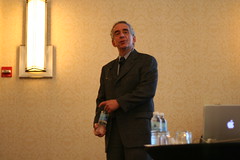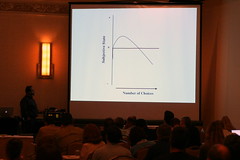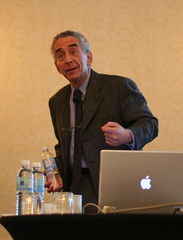UI Conf: Barry Schwartz, the paradox of choice
[Jesper’s live notes from UI Conf. Barry Schwartz really has some deep insightful psychological points, that we can actually use in our daily work as usability professionals.
His main point is that more choices actually makes choosing harder and sometimes can paralyze people. In contradiction to traditional research, he argues that, the more choices you present people to, the less satisified people will eventually be.]
Update: I recommend the notes from Luke Wroblewski if you like s short prosa of Barry Schwartz’ presentation.
The official syllogism
* More freedom means more welfare
* More choice means more freedom
* More choice means more welfare
– if there is one thing we could we couldn’t have enough of, it’s more freedom
This is the official syllogism. Everywhere in the us, we have operated as if this were true.
Barry’s cheap research
* 285 cookies
* 75 iced teas
* 275 cereals
* 40 toothpastes
* 230 soups
* 175 salad dressings (not including 12 extra virgin olive oils and 18 vinegars)
Circuit city: 6,5 million possible combinations of stereos in stock.
(amplifier, cd, equalizer, radio, etc)
To buy a phone today is really complicated. Cartoon of a phone that can do all these:
* phone
* mp3 player
* nosehair trimmer
* creme brulee torch
Choice not available: just a phone.
The same is true with healthcare (so many choices of subscription)
Also work has proven to implement:
We are free to work, at any day, at any minute to work wherever we are
Marital and family:
* “Should i get married”. No-brainer: YES
* “When should I get married”. No-brainer: As soon as possible
Nowadays
Every question is on the table. Married?, sooner or later?,
To summarize. Before ten commandments were written. Nowadays, it’s a [cartoon image] do-it-yourself ten commandments kit
Survey: People answer yes that there are too much to choose between.
Cars 80%, cell phones 78%, clothes 62%, …..
Paralyzed by too much choice
Buyinig jam in Palo alto
* 1 $ coupon saving
* 24 jams
* more people got to the table
* 1/10th bought more jam
* => Like having choice, but are
* 6 jams
Speed dating
increase efficiencies in mating ritual “and 6 months later there’s a wedding”
Finding: When you have seen more people, you make less choices
“I guess they go home and rent a video in stead”
401(K) investing [retirement plans]
* 2-3 mutual funds to choose from
* 10
* some even offere a few hundreds
Did this influence peoples participation
Despite theories on the opposite, people participated 2-3% less
I don’t know which one to choose, I’ll decide tomorrow, which in fact is no different from today. So the choice is procrastinated.
After choice, you get money from your employer. The only choice which was stupid, is NOT to choose. It’s like taking a match and putting fire to a 5,000$ bill.
Cartoon: superman cannot choose, standing between 25 dresses with all the alphabet letters
which one to choose
decision making.
effect on satisfaction. How satisified are people once they have chosen between 6.5million stereos?
* people mey do better
* but they may feel worse
buying jeans. presented with lots of choices
“I want the kind that used to be the only kind”. The shop assistant who was around 12, had no idea of what I was talking about
So, the more options there are, the more likely the fact that people will regret their choice.
From another cartoon: “Everything was better back when everything was worse!”

Use an agent to katalyze choice
Separate the torture from making choices: Use an agent.
Example call a friend: “What digital camera should I buy?”
Don’t ask “which one of these three models should I choose?”
* Take other peoples advice
* Give advice
* or better: Tell people what to choose
Reasonable defaults
Organ donor form example. 25% donors in the us. Triple that number for Europe. Only difference: In Europe, you sign NOT to donor your organ.
* People prefer a digtal CD player with 21 features to one with 7 (though they say it will be less usable)
* People who “build their own” add 19 features
* But people who actually use the 21-feature player first choose the simpler one
Lessons learned
* So, people HAVE to feel the pain, to have the whilmering experience.
* Somebody still have their gadget in their box. Never used it again.
* Can’t ask people to tell you: They don’t know
* Don’t do focus groups
Satisfaction curve
Subjective state related to number of choices.
[graph that tops at some choices]

Conclusion: welfare is not increased with number of choices. You figure out where the sweet spot is.
[My live notes from UI Conf. All UI Conf notes. Expect updates of thes rough notes, with references, images, etc. within the first few days – this footnote will stay, though. Feel free to add comments, links to similar notes, presentations, correct quotes and add where appropriate. thanks! Also I post my pictures on Flickr tagged uiconf]
Technorati Tags: barry schwartz, uiconf, ui11, choice, psychology, paradox, dating, speeddating, procrastination, retirement





November 2nd, 2006 at 18:22 (GMT-1)
I attended the conference as well, really enjoyed his talk. His book is filled with a lot more detail and background on the studies he’s done. Did he ever post his slides somewhere?
November 24th, 2006 at 14:12 (GMT-1)
[…] More info: My live notes from UI11 in October: Barry Schwartz: The Paradox of Choice. Also Luke Wroblewski made an excellent summary and later a comparison: The sweet spot on the curve. […]